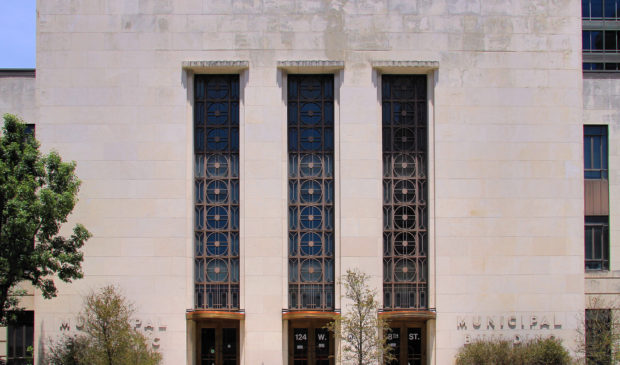Downtown court relocation plans draw mounting criticism
Tuesday, March 22, 2022 by
Chad Swiatecki Resistance appears to be growing to a slate of resolutions on the agenda for Thursday’s City Council meeting that would lead to the permanent relocation of the Downtown Austin Community Court to a circa-1800s municipal building on West Eighth Street.
The resolutions would follow action taken in February on the proposed move, allocating $27 million to renovate the three-story building and selecting the design-build method as the framework to begin seeking bids for the work.
One of the loudest voices against the move to the West Eighth location has been the Downtown Austin Alliance. In recent weeks, the organization has proposed using mobile courthouses to house the court, which has temporarily operated out of One Texas Center since losing its longtime lease on East Sixth Street due to redevelopment plans for the site.
The community court was created in 1999 to address class C misdemeanor offenses not requiring imprisonment, while also providing case management and housing-focused services for those experiencing homelessness. The nature of the court’s clientele makes a downtown location key, and the passage of Proposition B in 2021, which reinstated many penalties related to homelessness, has made the court’s role more critical than ever.
In a recent post for Austin Towers, Bill Brice, a DAA vice president, wrote that residents and businesses that oppose the relocation to West Eighth Street argue “the location is neither appropriate to address the complex and profound needs of the court’s target population nor proximal to treatment and service providers that serve the court’s clients,” while also calling into question the cost to renovate the structure.
The prospect of roughly three dozen daily visits by homeless or distressed clients in the area adjacent to prominent businesses and high-dollar residential projects such as the Brown Building Lofts has drawn resistance from residents. Some of that criticism also comes because of the city’s decision in May 2020 to designate the entire West Eighth site as being eventually converted to use for creative and nonprofit space.
Under the plans recently put forward by the city, the court would use the first floor and part of the second, leaving roughly one-and-a-half floors for creative use.
“One of the main goals of the Downtown Austin Community Court is to serve people experiencing homelessness. We believe we would be able to do this productively at the Municipal Building – once it’s renovated – based on its centralized location, space to provide services effectively, access to public transit, and parking for staff and public,” said a city spokesperson in an email to the Austin Monitor. “Under this proposal the entire third floor and a portion of the second floor could be made available for cultural or non‐profit uses and we are currently collaborating with the Austin Economic Development Corporation on opportunities.”
In an email outlining reasons why the city should pause and reconsider other sites for the relocation – including Waller Creek Center – Brown Building resident Hanan Levy said the move could lead to the deterioration of part of the core of downtown Austin.
“We realize no location is going to be ideal, but this is running the risk of making the Congress Avenue Historic District into the Austin Tenderloin and to suffer the same fate as such areas in other cities like San Francisco, Seattle, etc. – sending us years back, and throwing millions away,” he wrote.
Levy and others critical of the move have said the city didn’t allow for enough community input and didn’t share all information about the evaluation process that led to the selection of the former city hall building. As part of the documentation for Thursday’s meeting, the city released a summary of the questions, with answers, submitted for a Jan. 25 online forum on the move held by Council Member Kathie Tovo, whose district includes most of downtown Austin.
August Harris, chair of the Downtown Commission, said the group hasn’t made a recommendation on the court’s relocation because city staffers haven’t made presentations that would allow for an agenda item with action. Harris said the Downtown Commission frequently has difficulty getting responses from city departments for requests for information, with the court situation being the latest example.
“We have yet to have a follow-up briefing on it, which is disappointing. I know there are a lot of folks that are unhappy about it and I don’t know that this is the best location or use for that building. Things happen downtown that we should be involved in beforehand, but (staffers) don’t come to us … and that is maddening. It’s going to cost a substantial amount and I don’t know if that is spending good money.”
Photo by Larry D. Moore, CC BY-SA 3.0, via Wikimedia Commons. This story has been updated with a statement from the city.
The Austin Monitor’s work is made possible by donations from the community. Though our reporting covers donors from time to time, we are careful to keep business and editorial efforts separate while maintaining transparency. A complete list of donors is available here, and our code of ethics is explained here.
You're a community leader
And we’re honored you look to us for serious, in-depth news. You know a strong community needs local and dedicated watchdog reporting. We’re here for you and that won’t change. Now will you take the powerful next step and support our nonprofit news organization?




